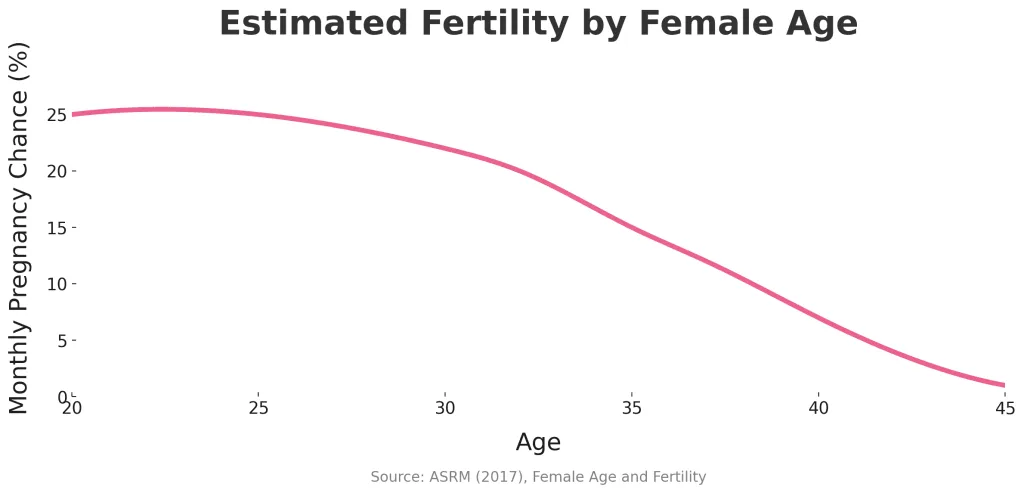Enter your age (and partner’s) to see your pregnancy chance per cycle and per act, how many months it may take to conceive, and when to seek help. We also estimate egg count, miscarriage risk, and IVF/IUI outlook using peer-reviewed data.
Pregnancy Chance per Cycle
0.00%
0.00% per random intercourseKey Fertility Metrics
This estimation does not replace professional medical advice. Always consult a healthcare provider.
Want more specific results?
- Considering IUI? The IUI success rate calculator shows odds by age and cycle details.
- Thinking about egg freezing? Check the egg freezing success rate by age and egg count.
- Have a semen report? Look up sperm morphology normal values and what they mean.
Understanding Your Results with our new Fertility Calculator
Fertility can be complicated, especially when age is a major factor. Our new Fertility Calculator gives you an overview of your likely chances of getting pregnant, how many cycles it might take, and how your egg supply may look at your current age. It also includes potential risks linked to age alone, and broad success rates if you were to consider assisted reproductive treatments like IVF or egg freezing.

Pregnancy Chance per Random Intercourse
This number shows how likely it is that you might conceive from a single, untimed act of intercourse. While it’s often lower than many people expect, it reflects real-world research showing that even healthy couples rarely get pregnant from just one casual encounter.
Pregnancy Chance per Cycle
Instead of looking at just one attempt, this figure estimates your chance of conceiving across a whole menstrual cycle. This estimate is a lot more reliable than a single-attempt calculation if you are frequently having intercourse, as it’s based on collections of peer-reviewed science that takes advantage of the law of large numbers.
Estimated Number of Cycles to Get Pregnant
Here, you’ll see about how many cycles you may need before achieving a pregnancy, based on that per-cycle chance. Some people conceive more quickly than expected, others take longer, so this value is really just a guide and should never be taken as a guarantee.
Estimated Egg Count by Age
Women have a set number of eggs, which gradually declines across the years. The calculator uses a model to estimate how many eggs you might have left. Although it can’t show your actual personal count, it can help explain why chances of pregnancy naturally fall over time as age goes up.
Risks
Age alone brings certain fertility-related risks, and this section looks specifically at numbers driven by how old you are:
- Miscarriage: Becomes more common as age increases.
- Genetic Conditions: Higher chances in later years, especially if you’re beyond your mid-30s.
- Infertility: Easier to conceive before 35, more challenging afterward. As you age, your chance of becoming infertile increases.
- When to Seek Help: If you’re under 35, waiting about a year of trying may be fine; if older, many guidelines suggest acting sooner.
Assisted Reproductive Technologies (ART) Success Rates
If natural attempts prove difficult, treatments like IVF, IUI, or egg freezing may come into play. The calculator gives rough success rates by age:
- IVF (in vitro fertilization): More effective than trying naturally, but still drops as women get older.
- IUI (intrauterine insemination): Less invasive but often has lower success rates compared to IVF.
- Egg Freezing: Can preserve fertility for future use, yet strongly tied to how old you are when the eggs are frozen.
Lifestyle Factors
Beyond age, the calculator also takes basic details like your smoking habits, alcohol intake, or weekly work hours. Studies link heavy smoking and high stress to lower fertility, while moderate drinking can sometimes have a milder effect.
Final Thoughts
Every individual’s fertility journey can be unique. These numbers won’t predict precisely what will happen, but they do offer a realistic sense of how age and certain lifestyle details might affect your chances. If your results raise any concerns or you’ve been trying longer than expected, it may be time to reach out to a healthcare professional for personalized advice and options.
Frequently Asked Questions
In the early–mid 20s, per-cycle chance is ~25–30%. It declines through the 30s (~15% by 35), drops faster after 37, ~8% by 40, and ~2–3% by 44. The calculator uses age-specific fecundability curves to reflect this year-by-year change.
It’s a screening threshold, not a cliff. Risks (lower conception odds, higher miscarriage/aneuploidy) rise gradually with age. Our model treats age as a continuum—turning 35 doesn’t halve your odds overnight.
Yes, more modestly. From the early 40s, sperm parameters and DNA integrity trend down, trimming chances and slightly raising miscarriage risk. Entering male age applies small, evidence-based adjustments to the couple’s combined estimate.
AMH reflects egg quantity, not egg quality. Quality (chromosomes) tracks strongly with age, so AMH can’t “cancel” age effects. High AMH may predict stronger IVF response; natural conception still follows age-related egg quality.
Healthy weight, no smoking, moderate alcohol, and regular exercise can improve odds within your age band and reduce time-to-pregnancy—but they can’t stop egg ageing. Think “tune-up,” not “reset.”
Our age curves assume regular ovulation. With PCOS/long cycles, day-to-day timing drives most of the variation. Use ovulation tracking (OPKs/BBT/ultrasound) alongside this age baseline for a more personalised forecast.
No. Hormonal contraception pauses ovulation but doesn’t slow egg ageing. Most users return to their age-matched baseline within 1–3 months after stopping.
Not necessarily. Start with timed intercourse and address modifiable factors (smoking, BMI, thyroid). Many clinicians step-up care: ovulation induction → IUI → IVF, with donor eggs if needed. Seek evaluation earlier as age rises.
Typical couples conceive within 3–6 cycles in their 20s/early 30s; timelines lengthen with age. Our tool shows 3-, 6-, and 12-cycle cumulative chances so you can plan realistically.
<35: after 12 months of trying. 35–39: after 6 months. ≥40: after 3 months—or sooner with irregular cycles, known factors, or recurrent loss.
